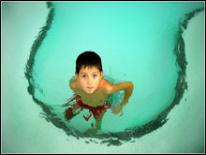
Drain your pool wisely
District of Columbia law prohibits the discharge of swimming pool water into public space. Chlorinated swimming pool water may also not be discharged into the municipal separate storm sewer system (MS4) or storm drain. The MS4 conveys water directly to rivers and streams, and chlorinated water can kill aquatic life. The penalty for a first offense is up to $1,000, and doubles for each subsequent offense. Please select one of the following two options below for discharging swimming pool water properly. Your discharge option will depend on where the pool is located within the District. Seek the advice of a licensed plumber about the appropriate way to connect the pool drainage system before discharging the water.
Option 1: Discharge pool water to the sanitary or combined sewer system
Swimming pool water may be discharged directly into the sanitary sewer or the combined sewer system in a manner that meets the standards of the District of Columbia plumbing codes and DC Water pretreatment program. Unlike the MS4, the sanitary sewer and combined sewer systems carry wastewater to the Blue Plains Wastewater Treatment Plant for removal of harmful pollutants before it is discharged to the Potomac River. To determine if you are in a combined sewer area, please visit Locate Your Watershed or call (202) 535-2600.
- If your swimming pool is not directly connected to the sanitary sewer, consider using other sanitary sewer connections in or around your home.
- Use a pump and hose to drain pool water into plumbing fixtures connected to the District’s sanitary or combined sewer.
- Seek the advice of a licensed plumber concerning the appropriate connections and flow rate for pumping and discharging the water.
- Be prepared to call a plumber immediately if draining the pool causes a back up to the sewer system.
- Do not direct pool water discharge to a private septic system.
- When washing pool filters, discharge the wash water to the sanitary sewer system. Depending on the type of filter, it might be as appropriate to throw the used filter in the trash for solid waste disposal.
Option 2: Dechlorinate pool water before discharging into the MS4
To determine if you are in a MS4 area, please visit Locate Your Watershed or call (202) 535-2600. Reduce chlorine in the pool water to undetectable levels (<(less than) 0.1 mg/L) before draining it into the MS4. Consider the following options for removing chlorine:
- Simply stop adding chlorine to your uncovered pool and wait. Sunlight will help to naturally dissipate the chlorine within 10 days. During that time, use a swimming pool test kit to measure chlorine.
- Chemically dechlorinate the pool water. Chemicals that will quickly remove chlorine are available through pool and spa care vendors. Follow the directions on the product label.
The chlorine in your pool provides benefits, but must be handled wisely
Chlorine is one of the most common chemical additives used to control bacterial growth in swimming pools. With proper chlorination, swimmers can allow pool water to contact the skin and incidentally swallow some pool water with little fear of infection. But as beneficial as chlorine can be in controlled situations, its release into the environment is illegal and punishable by law. The federal Clean Water Act and the DC Water Pollution Control Act prohibit the discharge of pollutants to the waters of the District of Columbia. Even seemingly small concentrations of chlorine can harm or kill aquatic life. The U.S. Environmental Protection Agency acknowledges that at 1mg/L or less chlorine has a high acute toxicity to aquatic organisms. It is against District and federal laws to discharge chlorinated water without first reducing chlorine to acceptable levels (< 0.1 mg/L). A pool test kit will help you to monitor chlorine. Some test kits will allow you to measure other important water quality parameters like pH, hardness, and alkalinity in addition to total and free chlorine. Follow the chemical use, handling, and storage instructions carefully, as some dechlorination products can become dangerous when brought into contact with other pool maintenance chemicals.
A note about chloramines
Chloramines, a disinfectant added to the District’s potable water supply, is toxic to some aquatic life. It is more stable than chlorine and will not readily dissipate by sitting or aerating. If you have added city water to your pool in recent weeks, consider chemically treating the pool to remove chloramines. Look for products specifically formulated for chloramines removal.
Any questions?
For more information or to report a possible illicit discharge, please call the District Department of the Environment’s Water Quality Division at (202) 535-2600.

